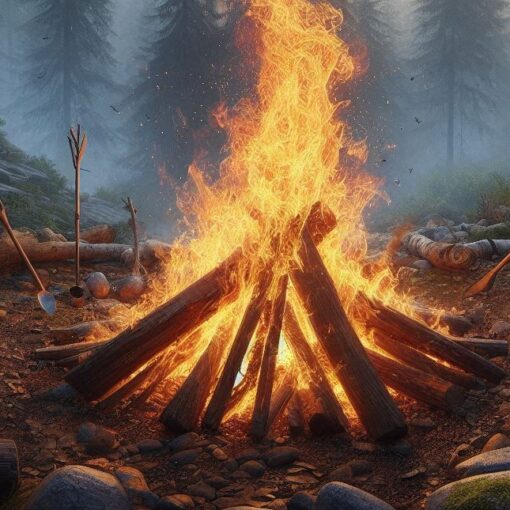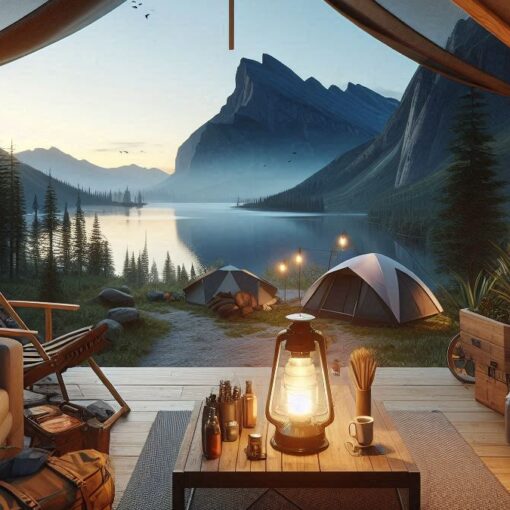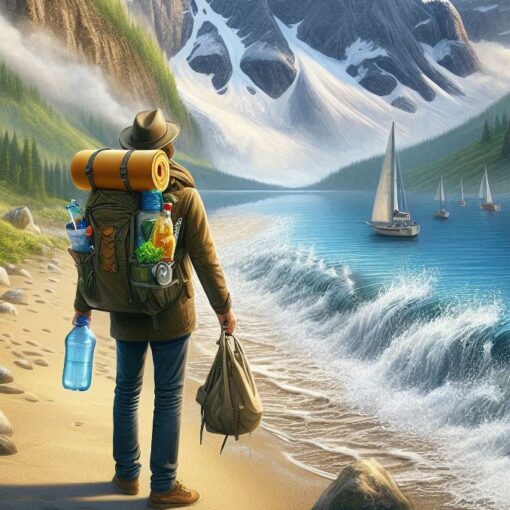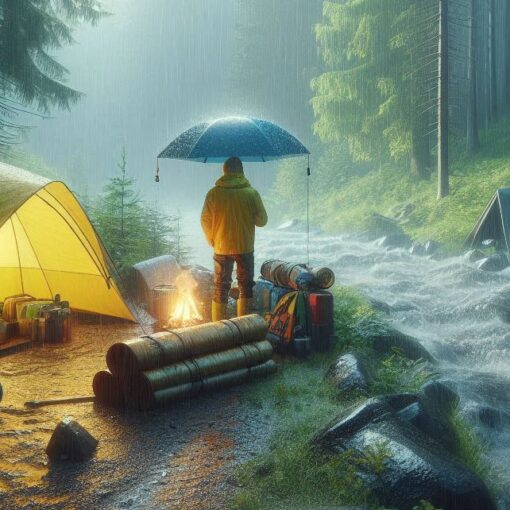Top Takeaways and Key Concepts
- Learn map and compass skills to navigate safely without relying on electronics.
- Practice fire-starting techniques to stay warm and cook food during outdoor trips.
- Build simple shelters to stay dry and protected in changing weather conditions.
- Carry a first aid kit and know how to treat cuts, blisters, and minor injuries.
- Stay calm and prepared by practicing survival skills before real emergencies happen.
Summary of This Article
This article teaches essential outdoor survival skills that help build confidence and independence in nature. It highlights the importance of knowing how to navigate with a map and compass, start a fire safely, and build simple shelters using natural or basic materials like tarps. It also explains why having a basic first aid kit and learning CPR can prevent small problems from becoming dangerous. With preparation and practice, anyone can enjoy memorable outdoor adventures safely.
Short Video Version of this Article
Have you ever glanced at a map and not known where you were? Like, where do I need to go? Or maybe you put up a tent and then thought, “Oh no!” I neglected to bring my sleeping bag! That’s the worst, isn’t it?
Please Note: This post may contain affiliate links. If you click one of them, we may receive a commission at no extra cost to you. As an Amazon Associate, I earn from qualifying purchases.
Don’t worry! We’re going to learn some really valuable outdoor skills. These will make you an outdoor magician instead of just a casual camper. Just think about all the great things that are going to happen to you!
Get your hiking boots on. We’re all set!

Knowing how to read a map can alter everything. It’s like unearthing a buried treasure! You’ll know where to go and what fun things are nearby. Also, you may show your pals how good you are at finding your way about. So, when they ask, “Where to next?” you may easily respond, “Follow me!”
Putting up a tent? It’s not just about setting it up. It takes some skill. If you can find level ground, you won’t have to sleep on a lumpy bed. And making sure you have everything you need before you leave? That’s just common sense. Believe me, it’s worth it to get a decent night’s sleep.
Knowing how to kindle a fire or cook outside are just a few of the little things that make it so much fun. Picture yourself sitting around a fire and cooking marshmallows. So warm! You might even like the taste of food cooked in the wild better. With nature as your backdrop, you’ll feel like a chef.
Are you a little nervous? That’s very typical! Everyone has to start somewhere, and you’ll get the hang of it. These talents will become second nature with practice.
Every time you go outside, you make fresh memories. Let’s accept the small bumps in the road. Later, they make the best stories, right? Imagine this: years from now, you’ll be able to laugh with your pals about the time you got lost or set up camp without a can opener. Those times are important.
Are you ready now? Let’s have some adventures that we’ll never forget! 🌲✨
Navigating the Great Outdoors: Map and Compass Skills

The first thing on our adventure list is to learn how to navigate. Picture this: you’re lost in the woods with only your phone, and then it dies. Yikes! That’s why it’s so important to know how to read a map and use a compass.
Get to know topographic maps first. These useful tools illustrate variations in elevation, paths, and points of interest. Don’t just look at them; read them like they’re an interesting book! When you can use the map to find things around you, you’ll feel like a real explorer.
Let’s talk about compasses! You could think they appear really easy, right? But when it comes to finding your way, they’re like little magic instruments. Keep your compass level in your hand. Now, turn until the needle points to the north marker. Bang! You know where you are! Isn’t it cool?
Practicing with it in places you know well is a big help. That way, it will feel natural when you’re out in the wild. You’ll feel like a pro!
And here’s a tip for you! Always have a backup plan for how to get where you’re going. A GPS or a smartphone app can be quite useful. But keep in mind that phones can get lost or batteries can die. So, if you have a compass available, you won’t have to guess which way to go.
Think about wandering through the woods. You’re free and enjoying nature. But suddenly you realize you’ve gone off the path. No worries, though! You can simply find your way back by just pulling out your compass.
You stay secure and ready for anything when you have a variety of navigation tools. People will look to you for help when they need it. That’s really cool!
Fire-Making Magic: The Art of Starting Fires

Next is how to make a fire, which is a talent that makes camping go from “meh” to “wow!” Imagine this: it’s cold outdoors, and all you want is to be warm while you roast marshmallows under the stars. You can have those times if you know how to safely build a fire.
Start by getting some tinder (such dried leaves or little twigs), kindling (a little bigger sticks), and fuel wood (the big logs). For the best airflow, put them in a teepee shape. It’s like building an architectural wonder right in nature!
Let’s talk about how to light a fire! Waterproof matches are great for lighting up your work. A lighter will also work if you want to feel fancy. Very simple! But if you want to be brave, consider going back to the basics. It can be hard to get the hang of friction techniques like bow drills or hand drills, but once you do, they feel so good!
But safety is the most important thing. Always make your fire far away from anything that could catch fire. No dry leaves or sticks nearby, for example. It’s smart to keep some water close by, just in case. You never know!
And this is a major one: never leave a campfire unattended. Really. It’s not only courteous, but it also keeps everyone safe. Picture a fun night with friends around a fire, laughing, but then—oops—the fire gets too huge because no one was paying attention. Wow, right?
So, keep things calm and comfortable. That way, everyone can relax and enjoy the warmth and light. Make sure to put it out entirely when you’re done. First, safety. Then, fun.
Shelter Building: Your Home Away from Home
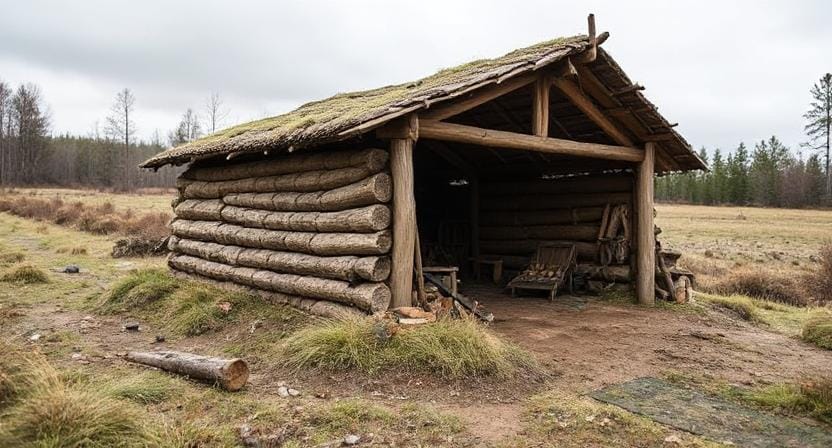
We have food cooking over our raging fire, now let’s talk about how to build a shelter. Comfort is important, even in the woods! Knowing how to make good shelters is important whether you get caught in the rain or need to stay warm on cold evenings.
Start by looking for places to set up camp. Look for level terrain that is far away from things like flooded areas or falling branches (believe me on this one!). You can make several kinds of shelters, such lean-tos or A-frames, depending on what materials are around you, like branches and leaves.
Let’s speak about tarps! They’re rather useful, aren’t they? Tarps are great whether you want to go on an adventure or simply be a little creative. incredibly light and incredibly flexible! It’s fantastic that you can set them up quickly when you just want to relax.
Put them between two trees. Check to see if it’s at an angle. This manner, the water won’t pool up if it rains; it will run off. A wet spot to sit on is the worst!
Also, ventilation is quite important. You want to be able to get fresh air while still being safe from the rain, wind, or anything else Mother Nature throws at you. After all the work you put into making your small retreat, who wants to feel cramped and stuffy? A nice breeze may make your place feel warm and open.
It’s all about being comfortable while being warm. So go ahead and set up your little adventure headquarters with those tarps!
Basic First Aid: Be Prepared for Anything
Let’s be honest: going on adventures can be dangerous. If you get blisters from hiking too much or bug bites that make you itch, knowing how to do basic first aid will help you out when things go wrong.
First, put together a small first aid kit with things like sticky bandages, antiseptic wipes, and gauze pads. You know the usual suspects! But knowledge is more important than materials. Learn how to properly treat common injuries like cuts and sprains.
Let’s talk about CPR. It seems serious, but if you know the essentials, you may truly aid someone who is in danger. Picture yourself in the woods, with tall trees all around you and the sounds of birds. Someone needs aid right now. When you panic, things can get worse. But if you’ve practiced CPR, you can act swiftly. It matters a lot.
And hey, I hope I’ve made it apparent that packing for your outdoor trips is more than just throwing food in your backpack. I get that snacks are really necessary! You can’t hike on an empty stomach, can you?
If you learn these outdoor talents, a typical trip can become a fantastic one. Every journey should leave you with good memories, not fearful ones. You want stories to share, not things you’d rather not remember. Being ready and sure of yourself is the key. Have fun every minute!
Outdoor survival skills like navigation, fire-building, shelter construction, and first aid are essential for staying safe and independent in nature. Learning these basics helps prevent emergencies, boosts confidence outdoors, and prepares you to handle unexpected situations with calm problem-solving and practical skills.
Frequently Asked Questions
What is the most important outdoor survival skill for beginners?
The most important skill is navigation using a map and compass because it prevents getting lost and helps you find your way safely without relying on electronics.
How can I start a campfire safely?
Use dry tinder, kindling, and fuel wood to build a small fire and keep water nearby. Always clear the area of debris and never leave a fire unattended.
What is the easiest survival shelter to build?
A simple tarp shelter is the easiest and quickest to set up. It provides protection from wind and rain with minimal materials and effort.
What should I include in a basic first aid kit for camping?
Pack adhesive bandages, antiseptic wipes, gauze pads, medical tape, tweezers, pain relievers, and blister care items for common outdoor injuries.
Why is practicing survival skills important?
Regular practice helps you build confidence and react quickly in emergencies without panic, improving your chances of staying safe outdoors.
Do I really need a compass if I have GPS?
Yes, because GPS devices can lose signal or run out of battery. A compass is a reliable backup that works anywhere.
How do I stay calm in outdoor emergency situations?
Stay focused on problem-solving, use your training, take deep breaths, and follow your emergency plan step by step to stay in control.
Suggested Resources:
Wilderness Survival Skills
https://www.wilderness-survival.net/
The Ultimate Guide to Camping
https://www.rei.com/learn/expert-advice/camping.html

Kevin Collier is a seasoned outdoor enthusiast and writer for Trekbug.com, specializing in outdoor adventures, survival strategies, and prepping insights. With a deep love for nature and a commitment to self-sufficiency, Kevin empowers readers to embrace the wilderness confidently. He shares valuable tips, practical techniques, and inspiring stories, helping both novice and experienced adventurers develop essential skills for surviving and thriving in the great outdoors.


